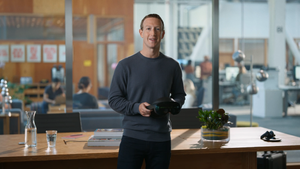French firm Thomson is fusing two of its products into a combined IPTV and VOIP service platform
October 12, 2006

PARIS -- Broadband World Forum Europe -- Thomson S.A. (NYSE: TMS; Euronext Paris: 18453) is the latest company to fly the convergence flag with news of a new product combination that pulls together two of the industry hot technologies -- VOIP and IPTV. The French company also announced a fixed/mobile convergence deployment at French competitive operator Free . (See Thomson Offers Combo and Free Uses Thomson for FMC.)
That's interesting enough in itself. What makes Thomson's developments even more interesting is that they're being driven by Jacques Dunogué, the former President of Alcatel Europe who jumped ship soon after Alcatel (NYSE: ALA; Paris: CGEP:PA) and Lucent Technologies Inc. (NYSE: LU) announced their engagement. (See Alcatel Suffers First Merger Casualty.)
At the time, sources inside Alcatel said he left after failing to get the COO position that was handed to, and then rescinded by, Mike Quigley. (See Alcatel Suffers First Merger Casualty, Alcatel, Lucent Seal Deal, and Quigley Steps Down as Lucatel COO.)
Dunogué says he was already talking to Thomson at that time. So how does Thomson compare with its mighty Parisian neighbor? "It's much smaller," he remarks with a smile.
It is also providing him with a greater level of control and responsibility. As senior executive VP of the Systems Division at Thomson, Dunogué is responsible for the company's full range of telecom assets, from the home devices such as set-top boxes and home gateways, to video content processing equipment such as encoders, though to the Cirpack softswitch and Smartvision IPTV middleware systems that Thomson acquired during the past 16 months. (See Thomson Buys Cirpack and Thomson Buys IPTV Player.)
The revenues are significant. In the first six months of this year the Systems division generated €1.2 billion ($1.5 billion) in sales, about two thirds of which came from the home devices. The company has a long history in set-top boxes and, according to market statistics from Dell'Oro, commanded almost 50 percent of the global market for dual and triple play home gateways.
Thomson's latest home gateway announcement, being promoted here this week, is about its deal with BT Group, an engagement Light Reading reported on months ago. (See BT Gets a Gateway and Thomson Ships BT Home Hub.)
Now Dunogué is looking to ramp up business in the other Systems lines, and believes a converged softswitch/IPTV middleware platform will prove an attractive prospect for Tier 2/Tier 3 carriers, and even cable operators, looking to provide triple play services with the minimum fuss.
Smartvision doesn't currently have the IPTV middleware market recognition that companies such as Microsoft Corp. (Nasdaq: MSFT), Siemens Communications Group , with its Myrio middleware, Lucent (MiViewTV), Minerva Networks Inc. , and Orca Interactive Ltd. have, but it's the technology behind one of the world's biggest IPTV rollouts -- at Orange (NYSE: FTE) -- and is used in about 10 commercial deployments, including Síminn and Telecom Italia Mobile SpA (Milan: TIM), that are serving more than 500,000 subscribers, says Dunogué. (See FT Offers 'Bouquet TV' and IPTV in Iceland.)
The Cirpack softswitch, meanwhile, has been racking up customers in Europe for years, and has more than 80 deployments with license sales topping 4 million VOIP lines, says Dunogué. (See Thomson's Softswitch Tops 4M and VOIP Finds Home in Eastern Europe.)
While the market considers that combination, Thomson will continue to beef up its home devices line-up. Dunogué says Thomson will unveil a next-generation IP set-top box during the next quarter, and is adding functionality to its home gateway products, such as high definition sound (which sounded crystal clear during a short demo) to enhance services such as Internet radio.
But can Thomson deliver at a price the carriers can afford? The Home Gateway Initiative (HGI) is looking for multifunctional units at a price per box of up to €70 ($87.79). (See Telcos, Vendors Battle Over Gateway.)
"We hit those price targets. We're pushing a lot of hardware, about 25 million home units this year, so we have the economies of scale. And while we sell the hardware initially, we then have the chance to follow up with additional software sales. The value is increasingly in the software," says Dunogué.
Generating growth across the Systems division, while challenging, is not Dunogué's main problem. "The main problems are at the bottom line. We need to strive to be more efficient."
— Ray Le Maistre, International News Editor, Light Reading
You May Also Like









